

How the Pioneers of the MOOC Got It Wrong. In 2011, when Stanford computer scientists Sebastian Thrun and Peter Norvig came up with the bright idea of streaming their robotics lectures over the Internet, they knew it was an inventive departure from the usual college course.
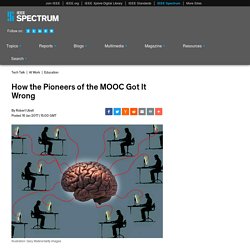
For hundreds of years, professors had lectured to groups of no more than a few hundred students. But MOOCs—massive open online courses—made it possible to reach many thousands at once. Through the extraordinary reach of the Internet, learners could log on to lectures streamed to wherever they happened to be. To date, about 58 million people have signed up for a MOOC. Familiar with the technical elements required for a MOOC—video streaming, IT infrastructure, the Internet—MOOC developers put code together to send their lectures into cyberspace. These MOOC pioneers were therefore stunned when their online courses didn’t perform anything like they had expected. What accounts for MOOCs’ modest performance? Once thought to be a fad, MOOCs showed staying power in 2016. Dive Brief: EdSurge profiles the growth of massive online open courses in 2016, which attracted more than 58 million students in over 700 colleges and universities last year.
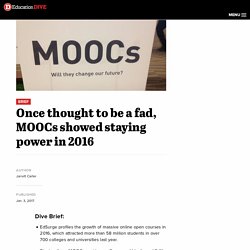
The top three MOOC providers — Coursera, Udacity and EdX — collectively grossed more than $100 million last year, as much of the content provided on these platforms shifted from free to paywall guarded materials. Many MOOCs have moved to offering credentialing programs or nanodegree offerings to increase their value in industrial marketplaces. The MOOC revolution that wasn’t. What happened to the MOOC revolution?
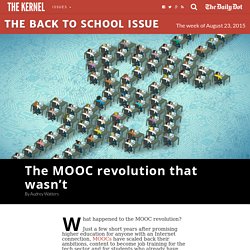
Just a few short years after promising higher education for anyone with an Internet connection, MOOCs have scaled back their ambitions, content to become job training for the tech sector and for students who already have college degrees. At what was arguably the peak of the hype about massive open online courses, the New York Times crowned 2012 as “The Year of the MOOC.” That was the year computer science professor Sebastian Thrun announced that, after an experiment teaching an online course that attracted 100,000 enrollees, he could no longer teach at Stanford; he was founding an online education startup, Udacity. That same year, his colleagues in the department, Andrew Ng and Daphne Koller, founded a competing MOOC startup, Coursera.
Harvard and MIT also launched their own (nonprofit) MOOC initiative, edX. Three years later, Thrun and the other MOOC startup founders are now telling a different story. Coursera Pilots Paid-Only Courses. MOOCs, Money, and the Untold Story of a Professor Who 'Bought the Hype' 5 reasons why I don't like MOOC's and probably never will - Learning VisionsLearning Visions.
They have been around for a while now, MOOC’s, or Massive Open Online Courses.
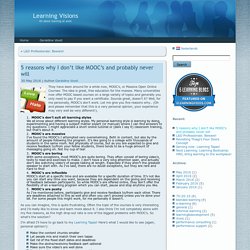
The idea is great, free education for the masses. Many universities now offer MOOC based courses on a large variety of topics and generally you only need to pay if you want a certificate. Sounds great, doesn’t it? Mooc model creates disciplinary ‘haves’ and ‘have-nots’ The advent of massive open online courses has created a world of “haves and have-nots” in terms of disciplines that can adapt easily to the format and those that cannot, according to new research.
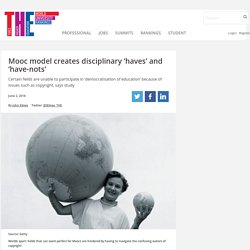
In his paper “The Online Future(s) of Teaching Japanese Popular Culture”, Chris McMorran, senior lecturer in the department of Japanese studies at the National University of Singapore, argues that while the Mooc is “democratising education”, some fields face significant obstacles in bringing courses online. Dr McMorran suggests that fields that seem perfect for Moocs, because they can make use of “exciting” visual and audio media such as clips from films and television shows as well as music videos, are hindered by having to “navigate the confusing waters of copyright”. He told Times Higher Education that this could prevent some subjects expanding their popularity and, in some cases, impede academics’ career progression. Course completion is wrong measure. In a fascinating survey taken at the start of the University of Derby’s ‘Dementia’ MOOC, using Canvas, where 775 learners were asked whether they expected to fully engage with the course, 477 said yes but 258 stated that they did NOT INTEND TO COMPLETE.
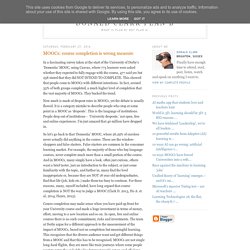
This showed that people come to MOOCs with different intentions. Report: MOOC Instructors Need More Support. MOOCs Report: MOOC Instructors Need More Support Providing more support for instructors may improve the student experience in massive open online courses (MOOCs), according to a study conducted by researchers from Penn State and the University of Central Florida.
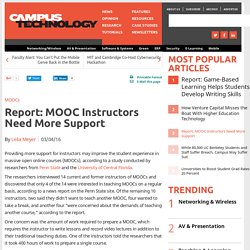
The researchers interviewed 14 current and former instructors of MOOCs and discovered that only 4 of the 14 were interested in teaching MOOCs on a regular basis, according to a news report on the Penn State site. Of the remaining 10 instructors, two said they didn't want to teach another MOOC, four wanted to take a break, and another four "were concerned about the demands of teaching another course," according to the report. One concern was the amount of work required to prepare a MOOC, which requires the instructor to write lessons and record video lectures in addition to their traditional teaching duties. Researchers still grapple with measuring quality in for-credit MOOCs. Dive Brief: Two researchers have recently published a paper analyzing how massive open online courses stack up in the Quality Matters rubric, which was designed for traditional online courses, finding all of the MOOCs studied — two each from Coursera, edX, and Udacity — failed to meet the minimum standard for quality.
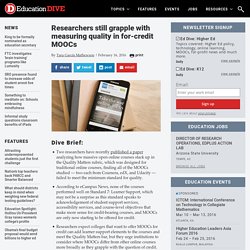
According to eCampus News, none of the courses performed well on Standard 7: Learner Support, which may not be a surprise as this standard speaks to acknowledgement of student support services, accessibility services, and course-level objectives that make more sense for credit-bearing courses, and MOOCs are only now starting to be offered for credit. Researchers expect colleges that want to offer MOOCs for credit can add learner support elements to the courses and meet the Quality Matters bar, but they urge institutions to consider where MOOCs differ from other online courses more broadly as they grapple with the question of credit. Dive Insight: Recommended Reading. Education Week. Thousands of ‘fake’ students at UK's new higher education colleges.
Thousands of students enrolled with a new breed of private higher education colleges are not registered to take recognised exams, the government’s spending watchdog revealed on Tuesday, raising fears that huge numbers of undergraduates have been benefiting from taxpayer subsidy without undertaking meaningful study.
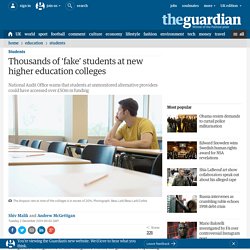
The National Audit Office also warned that the dropout rate among students at nine of the “alternative higher education providers” set up following reforms introduced by the former higher education minister David Willetts in 2012 was in excess of 20%. That is five times the dropout rate seen in traditional universities, with which the new colleges were designed to compete. The NAO warns that the private institutions, which can charge students £6,000 a year in fees, have not been properly monitored and pointed out that students attending them were eligible for cheap loans and in some cases grants.
How B.F. Skinner Will Save Online Education. The Real Revolution in Online Education Isn't MOOCs. By Michelle Weise | 10:00 AM October 17, 2014 Data is confirming what we already know: recruiting is an imprecise activity, and degrees don’t communicate much about a candidate’s potential and fit.
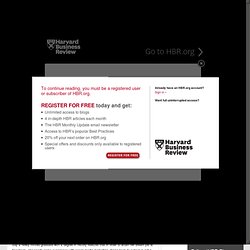
Employers need to know what a student knows and can do. Something is clearly wrong when only 11% of business leaders — compared to 96% of chief academic officers — believe that graduates have the requisite skills for the workforce. It’s therefore unlikely that business leaders are following closely what’s going on in higher education. The Online Education Revolution Drifts Off Course. Students at the Oakland Military Institute took several courses offered by San Jose State and the online course provider Udacity this year. The university is now scaling back its relationship with Udacity. Laura A. The Audacity: Thrun Learns A Lesson and Students Pay. Sebastian Thrun, founder of Udacity, one of the most high-profile private sector attempts to “disrupt” higher education discovered inequality this week. Thrun has spent the last three years dangling the shiny bauble of his elite academic pedigree and messianic vision of the future of higher education before investors and politicos.
He promised nothing short of radically transforming higher education for the future by delivering taped classroom lessons of elite professors through massive open online courses.So what went wrong? After low performance rates, low student satisfaction and faculty revolt, Thrun announced this week that he has given up on MOOCs as a vision for higher education disruption. Mooc creators criticise courses’ lack of creativity. Original vision lost in scramble for profit and repackaging of old ideas, say pair Source: Stephen Downes Look what they’ve done to my Mooc: ‘as deployed by commercial providers they resemble television shows or digital textbooks with – at best – an online quiz component,’ argues Stephen Downes When The New York Times declared 2012 the “Year of the Mooc”, you would have been forgiven for thinking that the term – which stands for “massive open online course” – had been coined some time that year.
Not so. Remaking education in the image of our desires. The current generation of students will witness the remaking of our education system. Change is happening on many fronts: economic, technological, paradigmatic, social, and the natural cycles of change that occur in complex social/technical systems. People have attempted to define change principles: Christensen’s disruptive innovation, Schumpeter’s creative destruction, Kuhn’s revolution structures, Paul A.
David’s model of long systemic change, and (my personal favorite) Carlota Perez’ techno-economic revolutions. Each of these are a different lens for viewing big, dramatic, change. Education faces enormous pressure. MOOCs, Hype, and the Precarious State of Higher Ed: Futurist Bryan Alexander. Does it continue to make sense to go to college when the sticker price of a college education is soaring, the amount of debt college students are taking on – even for the non-elite universities and what were formerly affordable public universities – is severely constraining their choices post-graduation, and job prospects for new graduates are dismal? A year ago, I talked with Anya Kamenetz, who delved into these issues in her book, DIY U. Since then, the ballyhooed arrival of free MOOCs into this frightening intersection of economic, intellectual, and social forces has ignited debate about the future of universities. The Reedie in me asks: What is the place of liberal arts ideals in an atmosphere like this?
Liberal arts education is not just about the transfer of cultural knowledge; the liberal arts are often said to be about learning how to learn and how to participate in public discourse vital to the growth of knowledge and health of democracies. Banner image credit: mathplourde. MOOCs could be disastrous for students and professors. Photo by Justin Sullivan/Getty Images. A MOOC Star Defects, at Least for Now - Technology.
By Marc Parry Mitchell Duneier once was a MOOC star. But today he's more like a conscientious objector. The big misunderstanding about MOOCs. The LMS Divide – Social Presence in Online Learning. Social Presence and Community of Inquiry Model The Community of Inquiry model, developed by Garrison, D. Inside the Coursera Hype Machine. Top 10 Misconceptions About MOOCs. It's not going to be your average first day of school.